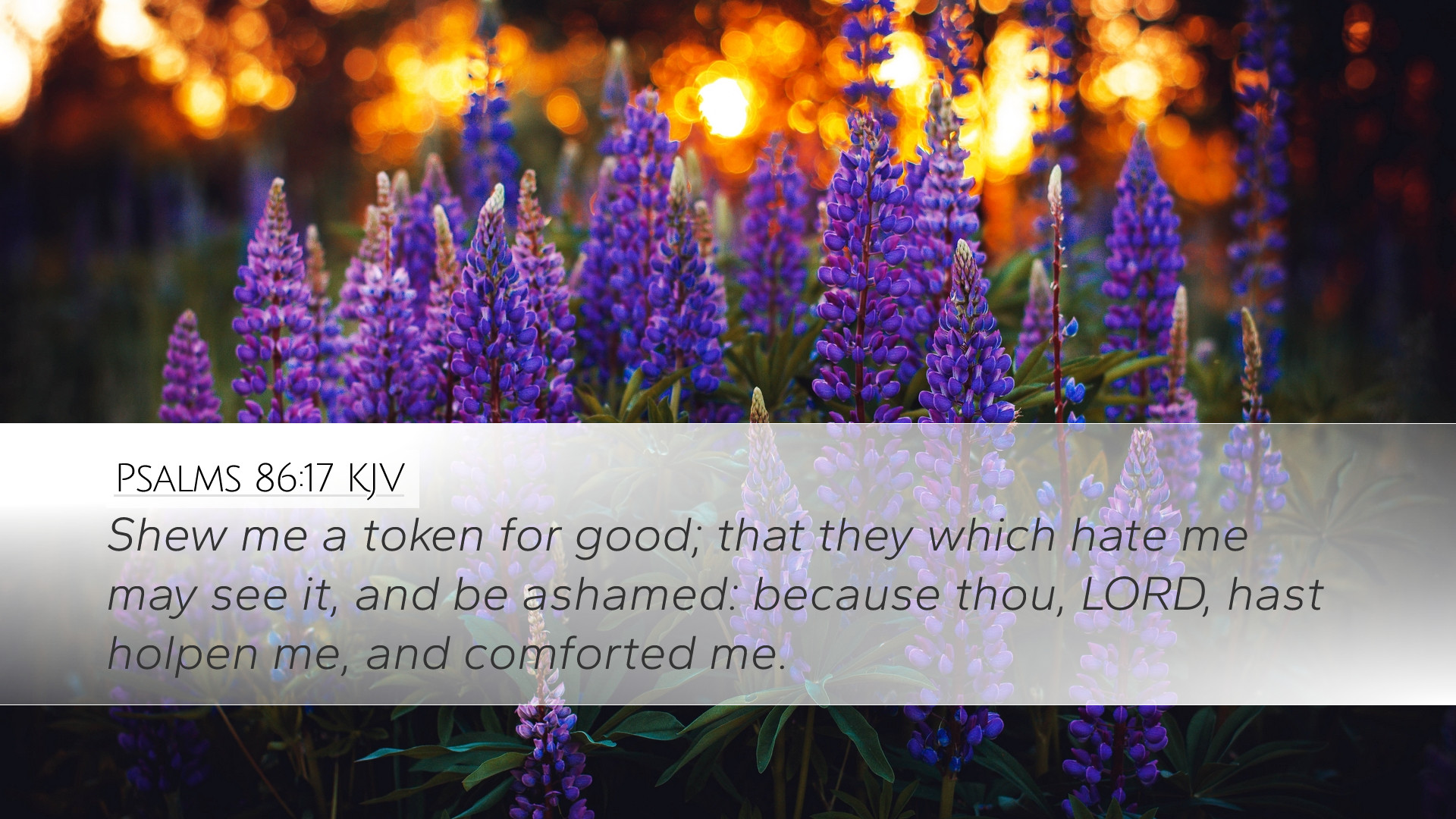Commentary on Psalms 86:17
Bible Verse: Psalms 86:17 – “Show me a token for good; that they which hate me may see it, and be ashamed: because thou, LORD, hast helped me, and comforted me.”
Introduction
This verse encapsulates a heartfelt plea for divine intervention and a demonstration of God’s favor. It reflects the psalmist’s deep reliance on God in the face of adversaries, calling upon Him to manifest His goodness as a testament to His unwavering support.
Historical Context
The Book of Psalms is a collection of religious songs, prayers, and poems that express the range of human emotions toward God. Psalm 86 is a plea for mercy from a servant of God facing trials, emphasizing themes such as reliance on God, His greatness, and the need for guidance and protection.
Verse Breakdown
- “Show me a token for good”
The psalmist requests a sign of God’s favor, often referred to as a "token." Such signs serve both to reassure the faithful and to testify against the wicked. This request highlights the need for tangible evidence of God’s blessings in times of distress.
- “that they which hate me may see it, and be ashamed”
The psalmist’s enemies are a source of distress, and their shame upon witnessing God’s favor underscores a key biblical theme – God’s vindication of His faithful servants. This notion of shame is not just personal but acts as a divine declaration of justice.
- “because thou, LORD, hast helped me, and comforted me”
This concluding phrase ties the psalmist's requests back to God’s past faithfulness, affirming His role as a helper and comforter. It suggests that the psalmist’s confidence rests on the history of God's support in times of trouble.
Theological Insights
The verse encourages a profound theological understanding of God’s sovereignty and His intimate involvement in the believer's life. It serves as a powerful affirmation of hope and assurance that God provides help and comfort in adversity.
- Divine Favor: The request for a token of good signifies the believer’s yearning for reassurance, a common theme in the lives of God’s servants throughout Scripture.
- Public Witness: The aspect of witnessing and shaming enemies suggests that God’s actions are not only for personal reassurance but are also intended for public testimony, reinforcing His glory.
- Comfort in Trials: This psalm demonstrates the importance of seeking comfort from God during times of distress, reflecting the nature of God as a source of solace.
Commentary Excerpts
Matthew Henry’s Commentary
Henry emphasizes the plea contained in this verse as an expression of faith, noting that the psalmist does not merely ask for personal affirmation but seeks a sign that has implications for the community and adversaries alike. He expounds on the nature of God’s help as being both present and historical, anchoring the believer’s hope in past deliverance.
Albert Barnes’ Commentary
Barnes comments on the indicative nature of the word "token," interpreting it as a sign that demonstrates divine favor. He highlights that such signs not only uplift the believer but also serve as a reminder to the opposition of God’s power and promise to protect His chosen.
Adam Clarke’s Commentary
Clarke presents a view on the necessity of visible evidence of God’s favor—tokens of good. He reflects on the psychological impact of God’s assistance, noting that divine comfort is not merely spiritual but has practical implications in how one confronts challenges and adversaries.
Practical Applications
- Encouragement in Prayer: This verse serves as a prompt for believers to seek God’s reassurance through prayer and to expect His intervention in their circumstances.
- Model of Faith: The psalmist's approach can be a model for modern believers, demonstrating the importance of expressing dependence on God and acknowledging His past faithfulness.
- Public Declaration: This verse challenges believers to live in a way that openly displays God’s goodness, inspiring shame or conviction in those who oppose God.
Conclusion
Psalms 86:17 is a profound scriptural anchor that reflects both deep faith in God's assistance and a desire for His glory to be displayed in the believer's life. It encourages pastors, theologians, and every follower of Christ to understand that we are part of a larger narrative where God’s action on our behalf serves as a testimony to the world.


